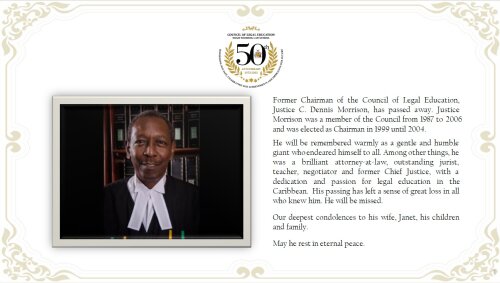Best Military Divorce Lawyers in Trinidad and Tobago
Share your needs with us, get contacted by law firms.
Free. Takes 2 min.
Free Guide to Hiring a Family Lawyer
Or refine your search by selecting a city:
List of the best lawyers in Trinidad and Tobago
About Military Divorce Law in Trinidad and Tobago:
Military divorce in Trinidad and Tobago is governed by the Family Law Act, which outlines the legal processes and rights of individuals going through a divorce involving a member of the military. This type of divorce can be complex due to factors such as military benefits, pensions, and the unique circumstances that come with being part of the armed forces.
Why You May Need a Lawyer:
Seeking legal assistance in a military divorce is important to ensure that your rights are protected and that you receive a fair settlement. A lawyer can provide guidance on the legal process, help navigate issues related to military benefits and pensions, and advocate for your interests in court if necessary.
Local Laws Overview:
In Trinidad and Tobago, military divorce falls under the jurisdiction of the Family Law Act. This law governs issues such as property division, spousal support, child custody, and visitation rights. It is important to be aware of these laws and how they may impact your divorce proceedings.
Frequently Asked Questions:
1. What is the process for filing for a military divorce in Trinidad and Tobago?
In Trinidad and Tobago, the process for filing for a military divorce is similar to a civilian divorce. You will need to file a petition with the Family Court outlining the grounds for divorce and any relevant issues such as child custody and property division.
2. How are military pensions divided in a military divorce in Trinidad and Tobago?
Military pensions are considered marital property and may be divided between spouses in a military divorce. The division of military pensions can be complex, and it is important to seek legal advice to ensure that you receive a fair share of these benefits.
3. Can I still receive military benefits after a military divorce in Trinidad and Tobago?
Whether you are entitled to receive military benefits after a military divorce in Trinidad and Tobago will depend on various factors, including the length of your marriage and the terms of your divorce settlement. It is advisable to consult a lawyer to understand your rights regarding military benefits.
4. How is child custody determined in a military divorce in Trinidad and Tobago?
Child custody arrangements in a military divorce in Trinidad and Tobago are determined based on the best interests of the child. Factors such as the child's relationship with each parent, their living arrangements, and their overall well-being will be considered in making custody decisions.
5. What are the grounds for military divorce in Trinidad and Tobago?
The grounds for military divorce in Trinidad and Tobago are similar to those for civilian divorce and may include adultery, cruelty, desertion, and irreconcilable differences. It is important to consult with a lawyer to understand the specific grounds that apply to your situation.
6. How long does a military divorce in Trinidad and Tobago typically take?
The duration of a military divorce in Trinidad and Tobago can vary depending on the complexity of the case and the willingness of both parties to cooperate. On average, a military divorce can take several months to a year to finalize.
7. Do I need to be present for court hearings in a military divorce in Trinidad and Tobago?
It is advisable to attend court hearings in a military divorce in Trinidad and Tobago, especially if issues such as child custody or property division are being contested. Your presence can help ensure that your interests are represented and that you have the opportunity to express your concerns to the court.
8. Can I modify a military divorce settlement in Trinidad and Tobago?
It is possible to modify a military divorce settlement in Trinidad and Tobago under certain circumstances, such as a significant change in your financial situation or a change in the needs of your children. You will need to file a petition with the court to request a modification of the settlement.
9. What are the costs associated with a military divorce in Trinidad and Tobago?
The costs associated with a military divorce in Trinidad and Tobago can vary depending on factors such as legal fees, court filing fees, and the complexity of the case. It is important to discuss potential costs with your lawyer upfront to understand what to expect.
10. How can a lawyer help me in a military divorce in Trinidad and Tobago?
A lawyer can provide valuable guidance and representation throughout the military divorce process. They can help you understand your rights, negotiate a fair settlement, and advocate for your interests in court if necessary. Having a lawyer on your side can help ensure the best possible outcome for your case.
Additional Resources:
If you are in need of legal assistance for a military divorce in Trinidad and Tobago, you may consider reaching out to the Trinidad and Tobago Bar Association or consulting with a family law attorney specialized in military divorces.
Next Steps:
If you are facing a military divorce in Trinidad and Tobago and require legal assistance, it is advisable to schedule a consultation with a family law attorney experienced in military divorces. They can provide you with personalized advice and guidance to help navigate the legal process and protect your rights throughout the divorce proceedings.
Lawzana helps you find the best lawyers and law firms in Trinidad and Tobago through a curated and pre-screened list of qualified legal professionals. Our platform offers rankings and detailed profiles of attorneys and law firms, allowing you to compare based on practice areas, including Military Divorce, experience, and client feedback.
Each profile includes a description of the firm's areas of practice, client reviews, team members and partners, year of establishment, spoken languages, office locations, contact information, social media presence, and any published articles or resources. Most firms on our platform speak English and are experienced in both local and international legal matters.
Get a quote from top-rated law firms in Trinidad and Tobago — quickly, securely, and without unnecessary hassle.
Disclaimer:
The information provided on this page is for general informational purposes only and does not constitute legal advice. While we strive to ensure the accuracy and relevance of the content, legal information may change over time, and interpretations of the law can vary. You should always consult with a qualified legal professional for advice specific to your situation.
We disclaim all liability for actions taken or not taken based on the content of this page. If you believe any information is incorrect or outdated, please contact us, and we will review and update it where appropriate.
Browse military divorce law firms by city in Trinidad and Tobago
Refine your search by selecting a city.















